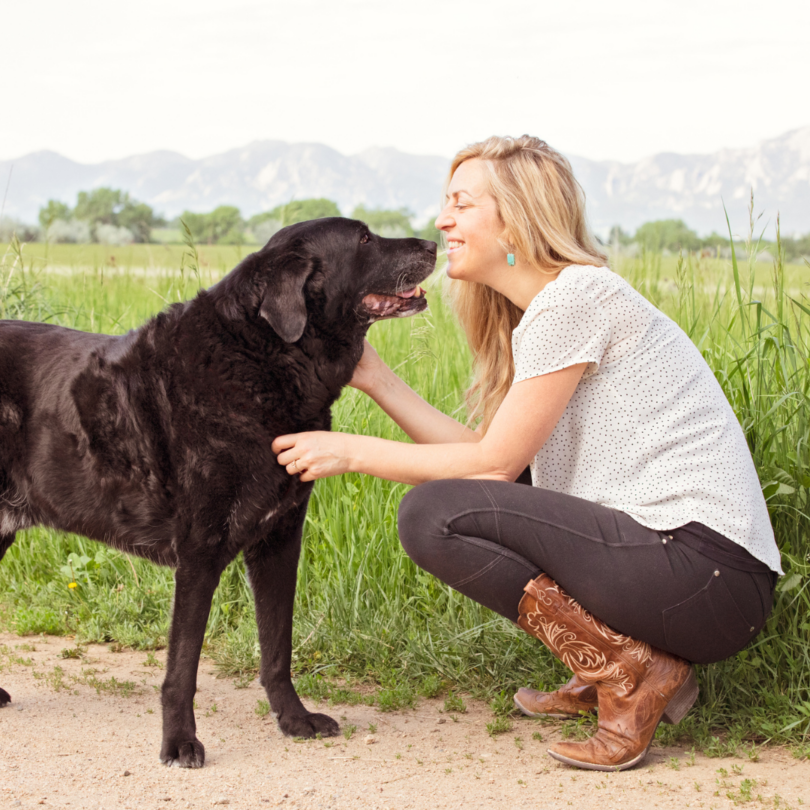In episode 62 of the Paws & Reward Podcast, Belinda Breen, a dog behavior professional currently earning her doctorate in clinical psychology, and Marissa Martino talk about an important topic: grief. It shows up in so many different ways in our relationships with our dogs and therefore it’s important that we shine a gentle light on it.
Whether we are saying goodbye to a beloved pet, making a hard rehoming decision, or letting go of how we thought life would be with our dog, we discover there’s an abundance of grief when opening our hearts to another living creature. We discuss the five stages of grief, why community is important during this process, and how to show up for others going through a difficult time. Watch our conversation on my YouTube Channel.
How are we defining grief in the context of our relationship with our dog? What are pet parents grieving?

Grief feels vague, unpredictable, and hard to define. It isn’t linear and can sneak up on us when we think we have moved on. As pet parents, we could be grieving a dog in a variety of ways: an aging pet, a change in their physical abilities, or changing your lifestyle to better accommodate your dog’s behavioral challenges. Even seeing our dogs grow from puppies to adolescents to adults can cause us to grieve what once was and will never be again.
There are 5 stages to grieving a dog:
Persistent, traumatic grief can cause us to cycle (sometimes quickly) through the stages of grief: denial, anger, bargaining, depression, and acceptance. These stages are our attempts to process change and protect ourselves while we adapt to a new reality. Elisabeth Kubler-Ross developed the five stages of grief in her 1969 book, On Death and Dying.
DENIAL – The first psychological defense we developed as humans, before humor or reasoning. It’s our basic defense mechanism. We don’t want to experience that depth of pain and so we deny that it exists at all. It can last for varying lengths of time and can pop up at any point in the grieving process. It can develop from loss of connection and our brains trying, and failing, to find that connection.
ANGER – Anger’s message is typically that a boundary has been violated. There is an unfairness to grief and can be a sort of violation of an expectation we had. We have this incredible emotion that tells us when something isn’t right and expressing it can be a privilege.
BARGAINING – It’s like contingency management. If I do this, then this. Or if I give this, then I’ll get that. There’s an air of desperation and an element of magical thinking where there’s a feeling of omnipotence. If I think a certain way then it’s going to happen. The feeling of more power over a situation that we actually have in reality. It can be holding on too hard to a result that isn’t realistic.
DEPRESSION – This is different from clinical depression. Getting in touch with the loss can be an achievement. We come to terms with the idea that the world is nuanced. It’s not all good or all bad and we can hold into both. Instead of avoiding the pain or denying the reality of the situation, we fully feel the loss.
ACCEPTANCE – Being pushed into this step before we are ready can feel like a threat to our agency. Acceptance, before we are ready, feels like a loss of control. True acceptance, when we are ready, is accompanied by peace. Acknowledgment that we don’t control everything.
How important is community when grieving a dog?
It’s important to have someone be an accurate mirror of ourselves when we are experiencing grief. When our mental health isn’t great, it’s extra important to be around people who have experienced grieving a dog and avoid pushing us toward acceptance before we’re ready.
If you want to support someone who is grieving a dog, ask them what would feel supportive. One person might prefer to speak about their loss while others want to sit in companionable silence. Don’t be afraid to ask them how they want you to show up for them and, as the griever, don’t be afraid to ask for what you need. By doing that, you’re bringing authenticity and making it easier for the other person to meet your needs.
When you find the community that feels best to you, lean into it. Not everyone is going to be the best person for each experience and that’s okay.
Where to find Belinda Breen:
- brbreen@ucdavis.edu

